Stop Using QuillBot to Rewrite Your Assignment (9 Common Grammatical Errors Made by AI Paraphrasers)

In today’s fast-paced academic environment, students are increasingly turning to paraphrasing tools like Quillbot to help them complete assignments more efficiently. However, while these tools may seem convenient, they often produce content that is riddled with grammatical errors. Teachers will detect Quillbot in your work, and the consequences can be severe. Here, we’ll explore nine common grammatical mistakes made by AI paraphraser tools and why relying on them may do more harm than good.
Grammatical Errors Made by AI Paraphrasers (Quillbot Screenshots)
We will be using QuillBot as an example of grammatical errors made by AI paraphrasers in 9 separate instances.
1. Misplaced Modifiers
One common issue with AI paraphrasers is the misuse of modifiers. These errors occur when a descriptive word or phrase is not placed next to the word it is meant to modify, leading to confusion. For example, a sentence like “She almost drove her kids to school every day” could be misinterpreted if rephrased poorly to “Almost every day she drove her kids to school.” This change alters the meaning, making it sound like she frequently took them, rather than almost doing so.
Guideline Example: Below is an example of QuillBott misplacing modifiers. In the second sentence of the rephrased text, the descriptive text “promotes creativity” seems to be modifying the action of readers investigating viewpoints instead of reading regularly as it is in the initial text.

2. Subject-Verb Agreement Errors
AI tools sometimes generate sentences where the subject and verb do not agree in number, leading to awkward or incorrect statements. For instance, “The group of students are excited” should correctly read “The group of students is excited.” The AI might misinterpret “group” as plural instead of singular.
Guideline Example: Look at the example below where QuillBot misinterprets “group of athletes” as plural instead of singular and thus rephrases it as “a bunch of athletes are riding bikes.”

3. Incorrect Tense Usage
Paraphrasing tools can struggle with maintaining consistent verb tenses throughout a rewritten passage. If a sentence originally in the past tense, like “She studied hard for her exams,” gets altered to “She studies hard for her exams,” it introduces a tense inconsistency that can mislead readers about the timeline of events.
Guideline Example: Below is an example of QuillBott rephrasing text and interfering with tense. The complainant’s actions of appealing the court’s ruling have been changed from future continuous tense (will be appealing) to future tense (will challenge). This changes the context of the phrase since future continuous tense are used to indicate more certainty than the simple future tense does
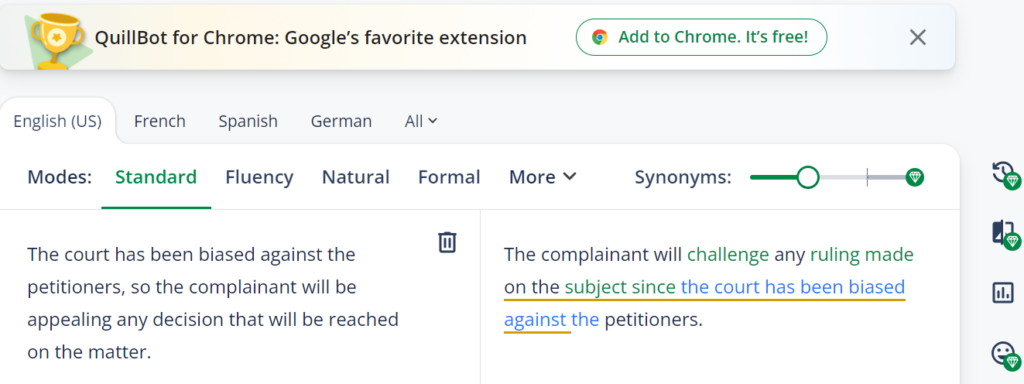
4. Overuse of Passive Voice
While passive voice has its place, overusing it can make writing unclear and dull. Paraphrasers like Quillbot might convert an active sentence such as “The teacher graded the papers” into “The papers were graded by the teacher.” This shift not only makes the sentence more convoluted but can also obscure who is performing the action.
Guideline Example: Below is an example of QuillBott overusing passive voice when rephrasing two conservative sentences:
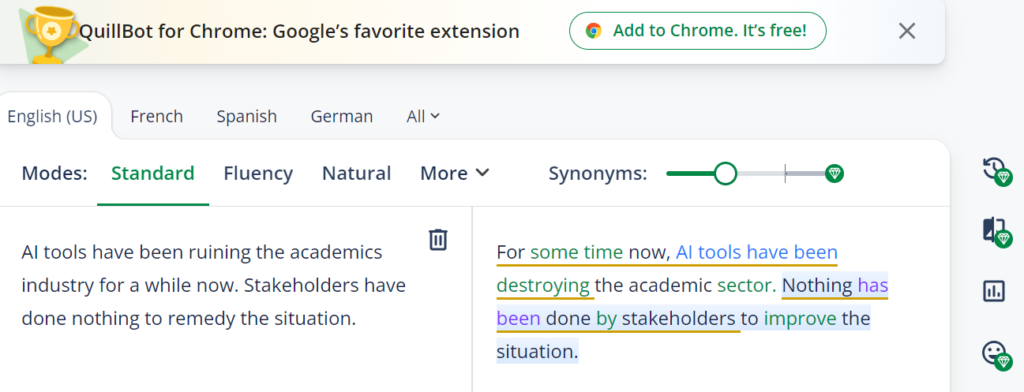
5. Awkward Sentence Structure
AI paraphrasers can produce awkwardly structured sentences that disrupt the flow of writing. A sentence like “Due to the heavy rain, the match was canceled by the officials” might be awkwardly rewritten to “The officials canceled the match, it was due to heavy rain.” This type of structure can confuse readers and lead to a lack of clarity.
Guideline Example: Below is an example of QuillBott producing awkwardly structured sentences that disrupt the flow of the initial writing:
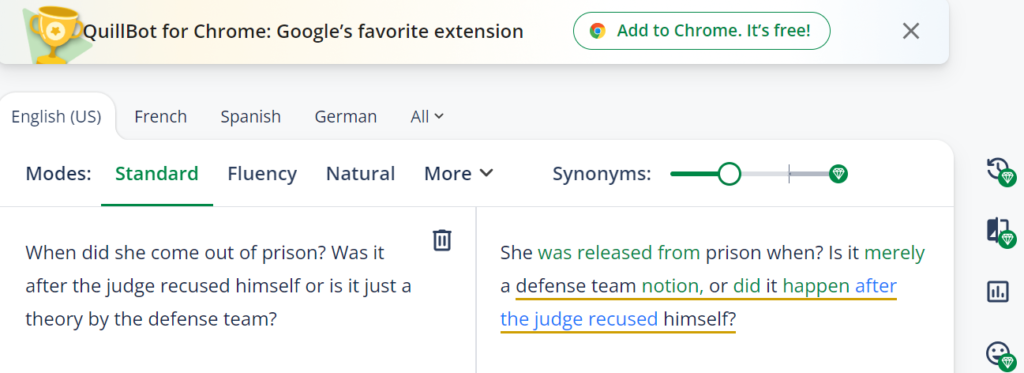
6. Inconsistent Pronoun Usage
Paraphrasing tools sometimes fail to maintain consistent pronouns, leading to ambiguity. For instance, if an original sentence reads, “When a student studies hard, they will succeed,” the AI might rephrase it to “When students study hard, he will succeed.” This inconsistency not only confuses readers but can also perpetuate gender biases.
7. Redundant Phrasing
Another common error is redundancy, where the AI may introduce unnecessary repetition. A sentence like “The final result was a complete and total success” could be overly paraphrased to “The final outcome was a complete total success,” which is unnecessarily wordy and repetitive.
Guideline Example: Below is an example of QuillBott introducing redundant phrases to the impression of statistical data about gun vilence:
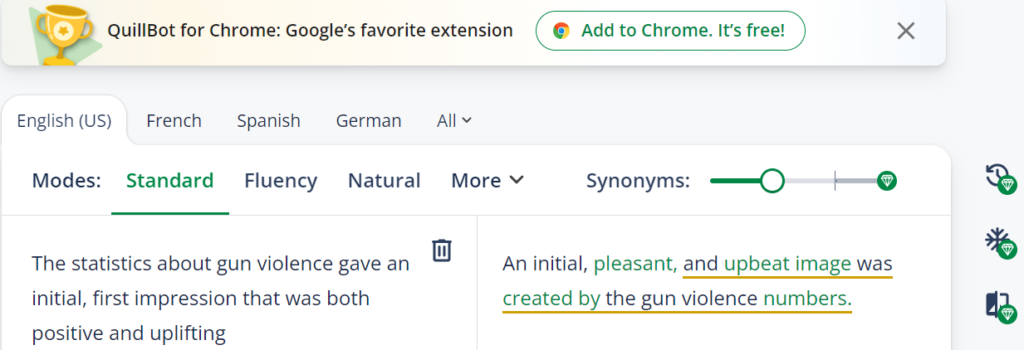
8. Punctuation Errors
AI tools can also struggle with punctuation, leading to misplaced commas or periods that alter the meaning of a sentence. For instance, “Let’s eat, Grandma!” versus “Let’s eat Grandma!” shows how a simple punctuation mistake can completely change the sentence’s meaning. If a paraphraser mistakenly omits or adds commas, it can lead to serious misinterpretations.
9. Wordiness
Paraphrasing tools often create unnecessarily wordy sentences that dilute the main idea. For example, instead of saying, “The committee will make a decision tomorrow,” an AI might generate, “The committee will come to a decision regarding the matter at hand tomorrow.” This kind of verbosity can make writing less effective and harder to follow.
Guideline Example: Here is an example of QuillBott adding unnecessary lengthy phrases to the original content. The word “leading” is replaced with “which could result in” and misplaced commas” is replaced with “commas that are not positioned correctly” making the sentence overly wordy.
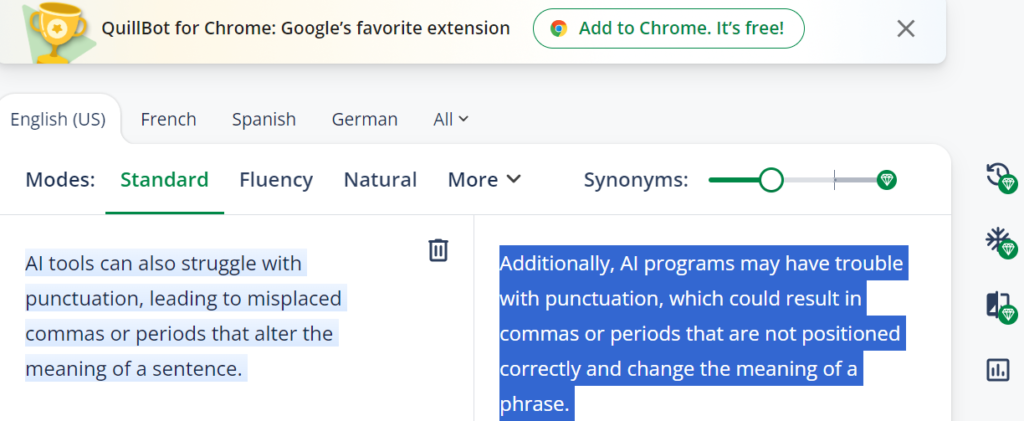
You can also read the following articles that expound on the risk of using AI tools:
20 Common Informal AI Phrases/Words Rephrased [AI Paraphrasing Tips ]
The Best AI Rephraser in 2024 is Human Paraphrasers (Screenshot Evidence)
8 Tips to Properly Paraphrase AI Content
Comparing Human vs. ChatGPT Rewrite: Which Is Better for Your Writing?
Common Mistakes by AI Tools and How to Paraphrase Them
Conclusion
While AI Paraphrasing tools like Quillbot may offer quick fixes for rewriting assignments, the risks associated with their use far outweigh the benefits. Teachers will detect Quillbot, especially when these common grammatical errors arise in your submissions. Rather than relying on AI paraphrasers, invest time in understanding your writing and developing your skills. Not only will this approach help you produce higher-quality work, but it will also foster a deeper comprehension of the subject matter. Remember, true learning comes from engaging with the material—something that no AI can replicate.